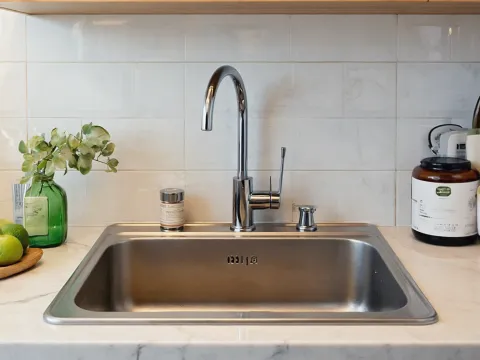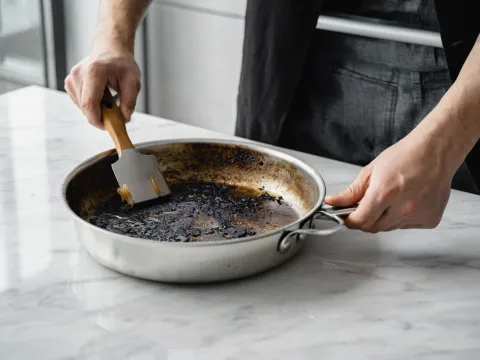Published on June 8, 2025
Last updated: June 8, 2025 · ⏱ 4 min read
Natural Ways to Deodorize Your Kitchen Sink

Understanding the Importance of a Fresh-Smelling Kitchen Sink
A kitchen sink is a central feature in any home, often used for washing dishes, preparing food, and even cleaning hands. However, it can also be a breeding ground for unpleasant odors if not properly maintained. Keeping your kitchen sink smelling fresh not only enhances your cooking environment but also contributes to overall kitchen hygiene. A sink that smells bad can deter you from culinary creativity and even indicate underlying issues that need attention. By establishing a few simple habits, you can ensure that your kitchen sink remains a pleasant place to work.
Establishing a Cleaning Routine
One of the most effective ways to keep your kitchen sink smelling fresh is through a consistent cleaning routine. Regularly scrubbing the sink with a gentle cleaner can prevent the buildup of grime and food particles that contribute to unpleasant odors. Aim to clean your sink daily or at least several times a week. Use a soft sponge or cloth to avoid scratching the surface. For a more thorough cleanse, consider using a mixture of baking soda and vinegar. This natural solution not only cleans but also deodorizes, leaving your sink smelling fresh.
The Role of Food Scraps in Odor Formation
Food scraps are often the primary culprits behind a stinky sink. Even small bits of food left behind can decompose and emit foul odors. It’s essential to dispose of food waste properly. If you use a garbage disposal, make sure to run it regularly and flush it with plenty of water. Additionally, avoid putting fibrous or starchy foods down the disposal as they can create clogs. Instead, consider composting vegetable scraps or using a sealed trash bin for other food waste. This practice not only keeps your sink smelling fresh but also promotes a more sustainable kitchen environment.
Natural Deodorizing Solutions
In addition to regular cleaning, utilizing natural deodorizing solutions can significantly enhance your sink's fragrance. Citrus fruits such as lemons and limes are excellent for this purpose. Simply cut a lemon in half and rub it along the sink’s surface to leave a fresh scent. You can also grind lemon peels in your garbage disposal to release their oils and neutralize odors. Another effective option is using essential oils. A few drops of oils such as tea tree, lavender, or eucalyptus mixed with water can be sprayed around the sink area to keep it smelling delightful.
Maintaining the Drainage System
A clean sink is only part of the equation. The drainage system also requires attention to maintain a fresh smell. Over time, debris can accumulate in the pipes, leading to unpleasant odors. To combat this, consider pouring a mixture of baking soda and vinegar down the drain once a month. This combination will fizz and help break down any buildup. After about 30 minutes, flush the drain with hot water to wash away any remnants. This simple maintenance step can significantly improve the overall smell of your kitchen sink.
Regular Inspection for Plumbing Issues
Sometimes, persistent odors can signal plumbing issues that require attention. Regularly inspect your sink and plumbing for leaks, clogs, or any signs of mold growth. If you notice any issues, it’s best to address them promptly. Not only can leaks lead to unpleasant smells, but they can also cause water damage over time. If you’re not comfortable inspecting the plumbing yourself, consider hiring a professional plumber for a thorough examination.
The Impact of Airflow and Ventilation
Airflow and ventilation play a crucial role in maintaining a fresh-smelling kitchen sink. A well-ventilated space can help dissipate odors more effectively. Ensure that your kitchen is properly ventilated by opening windows or using exhaust fans during cooking. Additionally, consider placing an air purifier in the kitchen to help reduce odors and improve air quality. By promoting good airflow, you can minimize any lingering smells that may come from your sink or cooking activities.
Choosing the Right Sink Materials
The material of your kitchen sink can also influence how well it retains odors. Stainless steel sinks are generally easy to clean and resist staining, making them a popular choice for odor management. On the other hand, certain porous materials may absorb smells more readily. If you’re in the market for a new sink, consider how the material will affect not only cleanliness but also odor retention. Opting for non-porous materials can help in keeping your sink smelling fresh with less effort.
Incorporating Fresh Herbs and Plants
Another delightful way to keep your kitchen sink area smelling fresh is by incorporating fresh herbs or plants nearby. Herbs like basil, mint, or rosemary not only enhance your cooking but also emit pleasant fragrances. You can place potted herbs on your kitchen counter or windowsill, or even hang them in small planters. This natural approach not only beautifies your kitchen but also adds a layer of freshness that can combat odors.
Educating Family Members About Kitchen Hygiene
Keeping your kitchen sink fresh is a team effort. Educating all members of your household about kitchen hygiene plays a crucial role in maintaining a pleasant environment. Encourage family members to rinse dishes before placing them in the sink, dispose of food scraps properly, and participate in regular cleaning routines. By fostering good habits and awareness, you can ensure that everyone contributes to the freshness of your kitchen sink.
Conclusion: A Fresh Kitchen Sink Equals a Happy Cooking Space
Maintaining a fresh-smelling kitchen sink involves a combination of regular cleaning, proper food disposal, and proactive maintenance of your plumbing. By incorporating natural deodorizing solutions and improving airflow, you can create a more pleasant cooking environment. Remember, a clean and odor-free sink not only enhances your kitchen’s hygiene but also makes everyday tasks more enjoyable.
With just a few simple habits—like rinsing after use, using baking soda and vinegar treatments, and avoiding food buildup—you’ll keep your sink fresh and your kitchen feeling like the welcoming space it should be.
FAQs: Natural Sink Deodorizing

Written by Soufyan from GrowToGrub
Soufyan is a gardening educator and founder of GrowToGrub. Through simple guides, easy recipes, and practical life hacks, he helps everyday growers turn small spaces into sustainable, delicious, and chemical-free living.


